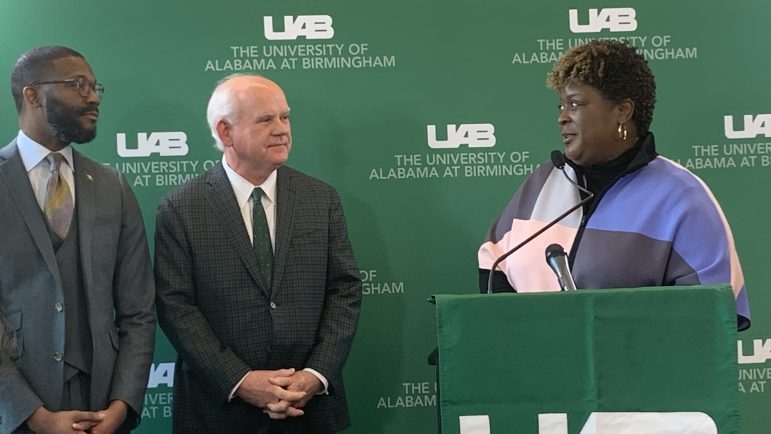For urban students interested in college, tuition can be a major barrier. So when it was announced recently that the Birmingham Promise would offer a full tuition scholarship to the University of Alabama at Birmingham, many praised the partnership as a way to give eligible Birmingham graduates a much-needed financial boost. But there’s just one problem: most students aren’t eligible to apply for the scholarship at UAB.
Eighteen-year-old Justin Smith is among those who are. He’ll attend UAB this fall. The Wenonah High School senior has big dreams.
“I plan on majoring in political science, maybe taking up a minor in journalism or psychology,” Smith says. “And my future plans are to go to law school but I do plan on running for president one day, about 30 years from here.”
His grades and test scores earned him a few scholarships, including the Birmingham Promise. That’ll cover his UAB tuition.
Janae Pierre,WBHM
Wenonah High School Senior Justin Smith.
“If it wasn’t for the Birmingham Promise, I probably wouldn’t be going to UAB because, you know, the prices are a little steep,” Smith says.
Tuition at UAB is about $10,000 per year for in-state students; that doesn’t include books, housing or a meal plan. Smith hopes the other scholarships will help cover the extra costs.
The Birmingham Promise offers Birmingham City Schools seniors full tuition at any in-state public two-year or four-year college or university. But students must meet an institution’s academic admission requirements. To qualify for the scholarship at UAB, students must score at least a 20 on the ACT and have a minimum 2.75 GPA.
That’s two things most of the system’s students don’t have. Out of about 1,200 high school seniors, only a tiny fraction qualify for the scholarship to UAB. According to Lisa Herring, superintendent of Birmingham schools, over 100 students are eligible. Herring says that’s a number she hopes will increase in the coming years.
“We are 100% wedded to making certain that as that population grows and we have an influence on that, we’ll have other opportunities for them to explore how to be successful,” she says.
Some of those opportunities don’t include college. Herring points to the Birmingham Promise apprenticeship, which matches students with regional employers so they can gain first-hand experience in business, finance and other areas.
Martha Kanter was U.S. Undersecretary of Education under former President Barack Obama’s administration. Now, Kanter is executive director of the College Promise Campaign, an organization that monitors promise scholarships across the nation. She says the bar might seem high for the Birmingham Promise scholarship, but eligibility requirements could change.
Kanter says for Birmingham, this is just a starting place.
“If you set a 2.75 or 3.0, you’re going to have more success stories and maybe that’s the starting place,” she says. “In the next couple of years maybe you can go down because you can guarantee a mentor for every student.”
Take the Tennessee Promise, where the GPA requirement is only a 2.0. Kanter says there, universities also match incoming students with a mentor.
She says most times, students just need to get their foot in the door.
A UAB spokesperson said in an email the university offers tutoring and other resources for students. Officials say there are in talks with Birmingham Mayor Randall Woodfin and city school officials to add more robust student support services.
The Birmingham Promise offers tuition scholarships to the state’s public two-year and four-year public colleges and universities. Alabama’s two-year public colleges have no minimum grade requirements for admission. Students must meet minimum grade requirements at other state higher education institutions.
“You’re seeing results where students are progressing at faster rates and they have clearer pathways,” Kanter says. “Even though the criteria is going to be different in these promise programs, it’s all about the results.”
Herring, the Birmingham schools superintendent, says the system is doing its best to prepare students for the future. She says the Birmingham Promise has created an awareness in several students who now see a future that’s attainable and debt-free.
So far, it seems to be working. Smith, the Wenonah High School senior, says almost a dozen students in his class will become freshmen at UAB in the fall. Last year, there was only one.

